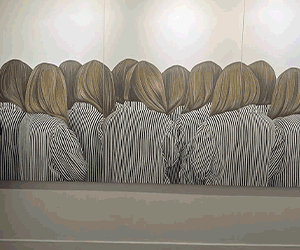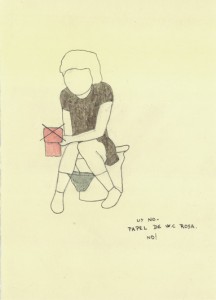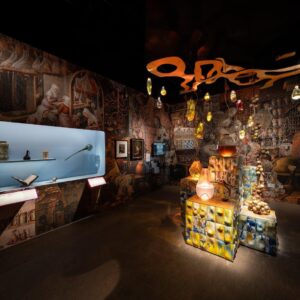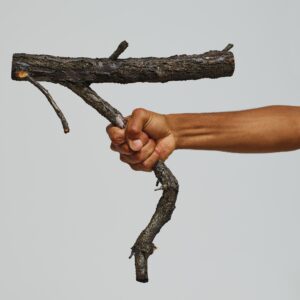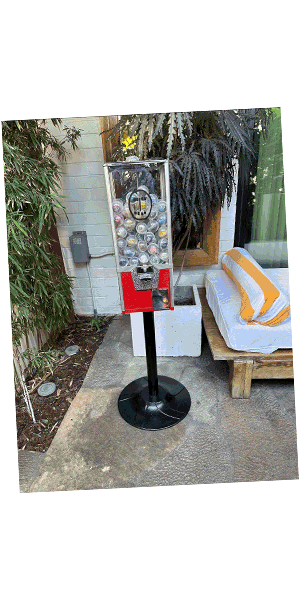1 When did you start to make art?
I guess when I finished the school of fine arts. Only after years introducing information in my head, I could start to make something I liked, I valued.
2 How did you evolve into a professional artist?
When I was learning I never expected to sell any of my paintings, I thought it would be impossible. But when time passed, I continued painting, working, and almost without knowing, I started to stop doing other kind of things. I started very shyly to sell my works. Actually it is a very spontaneous thing where one person passes a unique way. Suddenly you realize that it is something serious. That’s because the dedication and importance you put in the matter.
3 What drove you to make art as a professional vocation?
I thing you can not choose, it just happens because you can not do others things besides. But there are many reasons.
4 Explain your inspiration?
I’m very self-referential, a lot of things happen in my life all the time. I capitalize that. Also I like seeing others, I’m professional being nosey and doing gossip. Sometime I’m in a bar, and without intentions I start to hear a conversation that inspires me to make illustrations. Situations of the daily life inspire me, I take off the context and I put into a drawing. It’s like I make some moments eternal. Cinema/movies also inspire me, as well as books, music, old magazines, or staying with my friends and chatting. Always I have something of that.
5 In what way does your inspiration transform into ideas?
The inspirations automatically turn into ideas, a sentence passes my head, then I look for a situation to transform that sentence into a drawing, sometimes I find myself in a situation that leads me to the sentence, I adapt it until it goes this circle.
6 From Ideas to production of art ? how? And why?
Sometimes I use only a dark pencil and a felt-tip pen for drawing, sketch the situations or people to show/capture the ideas. I write, and like that I close the circle, not because I need to explain anything, the drawing supports the idea itself, but I think with words I can better describe that instant, I can make a turn more to the matter. It shows another aspect of the idea and broadens it. But for the more abstract ideas I use painting, with oil, collage…
7 Could your ideas be portrayed in any other medium? If so which?
Yes, many times I was thinking about. I think I would like to make little sculptures showing exactly the same situation, but three-dimensional. It could be very nice seeing it in material like ceramic, wood, plastic, the material may shows it better than always using the same line of drawing and colour. I would like to make it some day.
8 Which artists would you most like to blatantly rip off?
Uff, I would like steal from many artists!!! In fact, I think everybody flimsily does it (but it’s something abstract that we steal). I think that art is a thing of ways to take, you grow up, develop and advance in to your way. And very often you see other artists where you know they are exactly on the same way, it’s like the same point of view. So you get on a lot with these artists, and you look and say “what a wonderful thing, I want to do the some or transmit the same”. But nothing is unique from one person. Sure there are other artists thinking the same as you. In fact, when I intend to make something similar to someone, I can’t do it, it’s impossible. It always becomes another thing. But that’s very inspiring, to show an other artist that you like, you are fascinated about ones work, and that you know they follow the same path that you have also chosen. In spite you don’t know them personally, you know that if you had a conversation wit them, you would find out that you have a lot in common.
9 Why is your art made?
I wish to know that one day.
10 What does being an artists mean to you?
Being an artist is something you can’t choose. Being an artist on the one hand is a way of living. Because you always see things with this point of view, as objects of art that you make until you move into your life. I really believe in this. It’s nor easy at all, neither comfortable, the way that you’ve chosen, Creating something is very difficult, complex. It’s working with the unknown. Sometimes I ask myself, why I didn’t choose a job more comfortable. But if you are an artist, you don’t choose that. You are in all the things of your life, for the good and for the bad.
11 Are you happy with your reasons for making art? i.e Are there any trade offs that make life hard?
There are not a lot of reasons why you make art. It’s something almost necessary for you. Sometimes I’m happy about what I make and in other moments I’m very angry about it.
12 When does your art become successful?
On the one hand I think my art becomes successful when I am happy about what I’ve made, I’ve created, when it has some good aspects from your point of view and your truth. On the other hand it is successful when your things get noticed by the people.
13 What is art?
Uff…long and complex topic. But I think something is art when someone makes things true and honestly.
14 How do you start the process of making work?
Things I see, I hear, I feel, things that happen to me. Many times I write down something not to forget it. Then I translate it into my language of illustrations. Also painting I start with some abstract idea that becomes more and more clear, but not in focus. I don’t like to show everything, I like to let things more open, like it rare, so that the person who sees it must invest a minimum of work to decode it.
15 Who prices your work? And how is the price decided upon?
It depends. The years of work give you, like in other professions, a feeling for a price that is fair. It also depends if you are working with a gallery.
16 What is your next; move,project,show etc?
My project is to make a little book of illustrations. It would make me happy.
17 What are the pros and cons of the art market?
The art objects are an expensive merchandising. I would like it more accessible and so more could be sold, then more people could have art in their living rooms. It’s not easy living from art, it’s tiring, 50 % of your work is “selling” your art. When you sell something is good money, but always you must be attentive. You don’t have all your time to produce art.
18 Which pieces would you like to be remembered for?
I suppose for the pieces I like most, the works that are more finished (for me of course).
19 Any routine in making your artwork? If so what?
Sometimes. Sometimes, when I can choose, I work at night, there are other moments when I need to work during the day. Before I start I prepare everything, I like have to have all the materials near, to feel comfortable, because many times I don’t know which materials I will use. I prefer not to have any time limit, to predispose my work with calm, to think that I have all time I need. But sometimes this is difficult.
20 What has been the biggest break in your career?
The first change, and the most important, was not to work in other jobs. Having 24 hours of the day to work with your art. The first time I could do that, was like a rocket that left. Then, another important moment was when I got an atelier, and worked outside of my house, I went to a different place to make my art. Not only because I started to feel more professional, also for me it was very important to have more space, and my art evolved a lot. Another big change was when I started to make illustrations, transmit my ideas into drawings and not only into paintings, it’s something more real. But it was without understanding it, just because I needed it. Also because I finally found something more convincing to transmit my ideas.
21 Who has been the biggest influence on you?
There are a lot of artist I saw and admired from longer, sometimes because of their art or their techniques, or their ideas. I am also influenced by different decades, I don’t speak art only, I mean design, cinema, music. I was also influenced by some good artist friends, very close to me, with who I sometimes shared the same creative processes. There is a group of artists from the 60?s here in Argentina (called “the other figuration”). With them I started to think differently about how to make a painting. Then I admired NY in the 50?s, Rauschenberg, Motherwell. Then I could tell Tapies for the closeness to the primitive and simple, like I admire the children draws and spaces. For this I like Basquiat so much. I have many very very young illustrators who I really admire. There are a lot. But there is an artist called Juanjo S?ez, catalan, who I love. He has a perfect way to show his ideas.
22 How many artworks have you given away and to whom?
Usually I don’t give away my art. If I give away something, it is specially for someone, I don’t give away one work as a birthday present for example. I prefer giving away something I made for someone. I like it, when a work belongs to his/her personality, and maybe was inspired by this person.
www.blejman.net
www.myspace.com/veronicablejman
